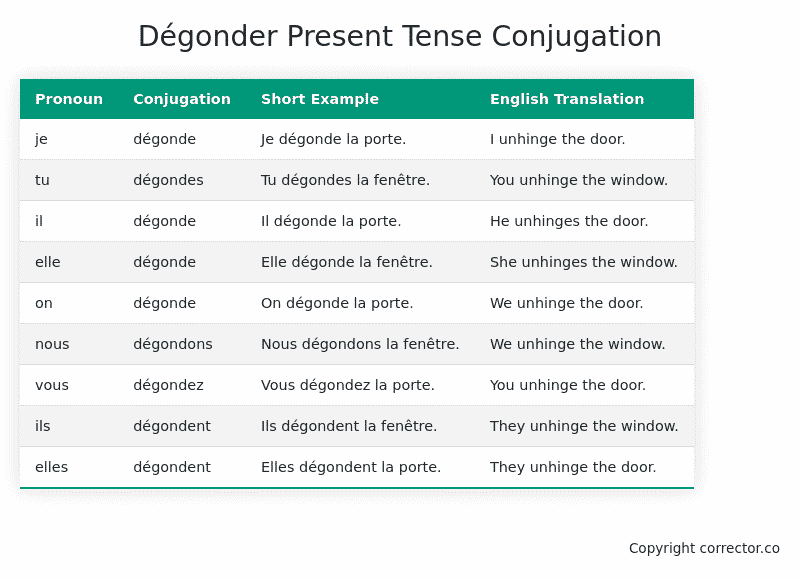Le Present (Present Tense) Conjugation of the French Verb dégonder
Introduction to the verb dégonder
The English translation of the French verb dégonder is “to remove a door from its hinges” or “to unhinge.” The pronunciation of the infinitive form, dégonder, is: deh-gohn-deh.
Dégonder is derived from the combination of the prefix “dé-” (indicating removal) and the word “gond” (meaning hinge). It is primarily used in everyday French to describe the action of taking a door off its hinges.
Examples:
-
Je vais dégonder la porte pour faciliter la livraison du nouveau canapé.
(I’m going to unhinge the door to ease the delivery of the new sofa.) -
Pour rénover la pièce, il faudra dégonder toutes les portes.
(To renovate the room, we’ll need to remove all the doors from their hinges.) -
Lors du déménagement, nous avons dû dégonder la porte d’entrée pour faire rentrer le piano.
(During the move, we had to take the front door off its hinges to fit in the piano.)
Dégonder – About the French Present Tense
To take a deep dive into all the French tenses then see our article on Mastering French Tense Conjugation.
Common Everyday Usage Patterns For Le Present
Interactions with Other Tenses
Table of the Present Tense Conjugation of dégonder
| Pronoun | Conjugation | Short Example | English Translation |
|---|---|---|---|
| je | dégonde | Je dégonde la porte. | I unhinge the door. |
| tu | dégondes | Tu dégondes la fenêtre. | You unhinge the window. |
| il | dégonde | Il dégonde la porte. | He unhinges the door. |
| elle | dégonde | Elle dégonde la fenêtre. | She unhinges the window. |
| on | dégonde | On dégonde la porte. | We unhinge the door. |
| nous | dégondons | Nous dégondons la fenêtre. | We unhinge the window. |
| vous | dégondez | Vous dégondez la porte. | You unhinge the door. |
| ils | dégondent | Ils dégondent la fenêtre. | They unhinge the window. |
| elles | dégondent | Elles dégondent la porte. | They unhinge the door. |
Other Conjugations for Dégonder.
Le Present (Present Tense) Conjugation of the French Verb dégonder (You’re reading it right now!)
Imparfait (Imperfect) Tense Conjugation of the French Verb dégonder
Passé Simple (Simple Past) Tense Conjugation of the French Verb dégonder
Passé Composé (Present Perfect) Tense Conjugation of the French Verb dégonder
Futur Simple (Simple Future) Tense Conjugation of the French Verb dégonder
Futur Proche (Near Future) Tense Conjugation of the French Verb dégonder
Plus-que-parfait (Pluperfect) Tense Conjugation of the French Verb dégonder
Passé Antérieur (Past Anterior) Tense Conjugation of the French Verb dégonder
Futur Antérieur (Future Anterior) Tense Conjugation of the French Verb dégonder
Subjonctif Présent (Subjunctive Present) Tense Conjugation of the French Verb dégonder
Subjonctif Passé (Subjunctive Past) Tense Conjugation of the French Verb dégonder
Subjonctif Imparfait (Subjunctive Imperfect) Tense Conjugation of the French Verb dégonder
Subjonctif Plus-que-parfait (Subjunctive Pluperfect) Tense Conjugation of the French Verb dégonder
Conditionnel Présent (Conditional Present) Tense Conjugation of the French Verb dégonder
Conditionnel Passé (Conditional Past) Tense Conjugation of the French Verb dégonder
Conditionnel Passé II (Conditional Past II) Tense Conjugation of the French Verb dégonder
L’impératif Présent (Imperative Present) Tense Conjugation of the French Verb dégonder
L’impératif Passé (Imperative Past) Tense Conjugation of the French Verb dégonder
L’infinitif Présent (Infinitive Present) Tense Conjugation of the French Verb dégonder
L’infinitif Passé (Infinitive Past) Tense Conjugation of the French Verb dégonder
Le Participe Présent (Present Participle) Tense Conjugation of the French Verb dégonder
Le Participe Passé (Past Participle) Tense Conjugation of the French Verb dégonder
Struggling with French verbs or the language in general? Why not use our free French Grammar Checker – no registration required!
Get a FREE Download Study Sheet of this Conjugation 🔥
Simply right click the image below, click “save image” and get your free reference for the dégonder present tense conjugation!

I hope you enjoyed this article on the verb dégonder. Still in a learning mood? Check out another TOTALLY random French verb present conjugation!


